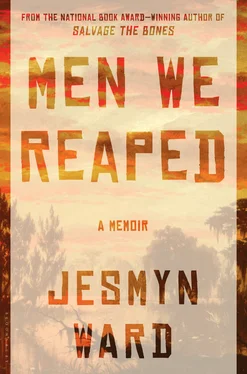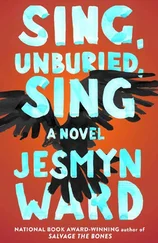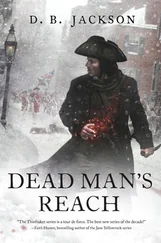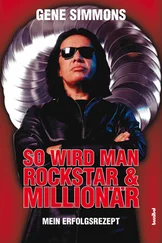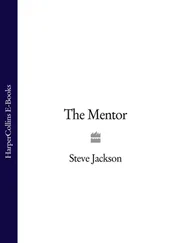The next time we met at Illusions was New Year’s Eve of 2004, over a year later, and there were more of us. This is when we took the picture with the God’s Gift background. I left my hair down, curly and big, wore a red one-shoulder shirt and red boots with silver studs and silver stiletto heels shaped skinny and sharp as knives. In the picture, we are all drunk, and everyone smiles. We know that taking this cheap picture is tacky, but we are a neighborhood, a community, a hood, a family, so we grin. Knees bend, hips angle, waists are grabbed. Drunk and sentimental, I loved every one of them for still being alive.
I never drove home when I was drunk. One of my more sober cousins or friends, one of my sisters maybe, drove us back to DeLisle that night, where we ended up in Demond’s yard at 4:00 A.M. The sky was deepest black, salted with stars. We were all drunk, all high, all smoking packs of Black & Mild cigars while we perched on car hoods. The music played in the cars where some of us sat having conversations, club-sweaty, intoxicated and serious. Demond wove his way through the cars with a 22-ounce of beer in his hand, talking and laughing.
“You on a all-night flight, huh?” he asked me as I leaned on the car next to my cousin Blake, passing a cigar back and forth, which I had never smoked before. It was so strong it was making me dizzy and tingly, and I liked the sensation, but not enough to smoke one again, I thought. It was making my throat burn.
The night pulsed with bugs; they gave low, staccato ticks. I smiled at Demond, at all of them. There was no place I wanted to be more than that yard, leaning on that car, interior lights flashing on and off, a lone streetlight a block away leaving us wide-eyed, struggling to see each other in the dark.
Demond ducked his head into the window of a car where two of my cousins were sitting and said, “Hey man, turn the music down.” He didn’t wait for them to reply and walked off, his dreads swinging. He liked the party, but he didn’t want the county cops to wander by and stop, drawn by the music, and he didn’t want the neighbors to complain. Not only did he have responsibilities, but he also had spent the last couple of years dodging the kind of bad luck that afflicts the innocent in drug-plagued neighborhoods, where every other cousin or friend is a drug dealer, every older cousin or friend an addict. Demond had been witness to the aftermath of a shooting and had agreed to testify against the alleged shooter. The shooting had occurred in DeLisle, during a holiday. He’d also agreed to testify against a drug dealer who wasn’t from DeLisle but had been operating in the neighborhood. His conscience had made him agree to testify in the first case, and since he’d been stopped while riding in a car with the drug dealer in the second case, self-preservation had made him agree to testify in the second. These things weighed on him and he felt he had no room for error.
My cousins rolled their eyes, said “Fuck that nigga,” and kept the volume where it was. The sun came up, washed the yard a milky gray, then white, and we departed one by one to our houses, where we eased open doors, tiptoed inside, and fell into dead sleeps while the sun burned its way higher into the sky and the community rose to face the day. Everything about the night seemed stolen, lived in those murky hours while others slept or worked. We crawled through time like roaches through the linings of walls, the neglected spaces and hours, foolishly happy that we were still alive even as we did everything to die.
On February 26, 2004, Demond was working third shift, at night. He called Rob before he left work, told him he would call him when he made it home, that maybe Rob could ride with him to a twenty-four-hour pharmacy in Gulfport, to Walmart, to get diapers for his daughter.
On another night, Demond would have driven to DeLisle, turned into Rob’s mother’s driveway, which dipped down from St. Stephen’s, and stopped to the side of Rob’s mother’s house. Rob would have loped out, slid into the passenger seat of the maroon two-door car, eased into conversation with Demond, and they would’ve driven up Lobouy Road, pine-cloaked under the night sky, thick with animal secrets, to the interstate. At that hour, Gulfport would have been desolate: a stretch of chain stores, fast-food restaurants, two-story hotels, neon lights, black and yellow oil-spotted parking lots, and beyond them, pines and ranch-style houses divided into subdivisions. Demond’s car would have been one of a few idling at stoplights, filling up in gas stations, parked near the doors at Walmart. They would have flicked the ashes from their cigars out the window to turn to dust on the asphalt. It would have been a night like any other, where the company of a friend eased Demond out of a shift spent standing, repetitively doing one thing or another. But this was not a night like any other night because Demond never showed up at Rob’s house.
Later, talk around the factory where Demond worked, from the guard shack, would be that there was a truck lurking near the gates, that someone was watching the cars leave after second shift, arrive for third. Instead of going to Rob’s after he left work, Demond went home. Rob waited for him and fell asleep. In Rob’s blue room, the light from the television pulled him into his dreams: Rob slept, and the light shone over him with an aluminum crackle, flashing, but he didn’t wake. Neither did anyone in the houses next to Demond’s, or in the house across the street. Neither did Demond’s fiancée or his daughter when someone stepped out of the bushes in front of Demond’s house and shot him as he walked up to his door, tired and grimy with dried sweat, wanting a shower, maybe a beer. Hours later, Demond’s absence in that cavernous room, in a cold bed, woke his fiancée. She looked outside and saw his car. She walked out on the porch, her small feet making the wood creak, and saw someone asleep on the lawn. Who was asleep in the yard? Demond lay there, his dreads splayed away from his head, his face still, his eyes open, his chest red; but for that, he would have been asleep. She fell on him and screamed.
Charine got the call at around seven o’clock the next morning. We had a de facto phone tree: the first person to hear would call the second person, who would call the third, who would call the fourth, and somewhere in that line someone would call Rob, who would call Nerissa, who would call Charine, who would tell me, no matter the time. I was home for my spring break, asleep, dreaming of nothing, when she came into my room in my mother’s house, switched on the light, and without preamble said, “Mimi, Demond’s been shot.” I heard her, covered my eyes, breathed. Death rushed me like water does the first summer jumper into a still-chill spring river.
“What the fuck!” I said.
Charine hopped from one foot to another.
“What happened?” I said.
“I don’t know. It might be drug-related. You know he was supposed to testify against that dude from New Orleans.”
Charine climbed into the bed with me, turned toward the wall. If she cried, she was silent, and I could not feel it in her back or her stomach. I spooned her, threw my arm over her ribs, held her like I had when she was a baby, when she was growing out of her chubby precociousness to walk, and I was an eight-year-old growing faster from the legs than anywhere else. She fell asleep, and every time my arm rose and fell with her breath, I thanked something that she still breathed, even as I was sick about it, whatever it was, that killed us one after the other. Senseless , I thought. This is never going to end , I thought. Never .
I woke up four hours later. My eyes were puffy and red, matted at the seams from crying, from sleeping. I threw on a sweatshirt and drove with Charine to meet Nerissa at Demond’s house. I played one song over and over in my car, parked on the street, felt the acute sense that life had promised me something when I was younger, that it wouldn’t be this hard, perhaps, that my people wouldn’t keep dying without end. I’m only twenty-six , I thought. I’m tired of this shit .
Читать дальше
